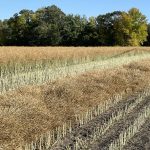Three provincial organizations in Western Canada are looking to their provincial governments for help as the battle over grain transportation reform enters its next phase.
“To have them on side certainly lends a lot of weight to our (position),” said Sinclair Harrison, president of the Saskatchewan Association of Rural Municipalities.
“We can only hope at this time that all four provinces come on board.”
An official with Alberta’s Wild Rose Agricultural Producers said having the provinces as allies will make it more difficult for the federal government to favor the wishes of railways or grain companies over grassroots farmers.
Read Also

Trade war may create Canadian economic opportunities
Canada’s current tariff woes could open chances for long-term economic growth and a stronger Canadian economy, consultant says — It’s happened before.
“The more people you have on side, the better, and of course the provinces are a big component of that,” said executive director Rod Scarlett.
With the failure of the consultation process led by Arthur Kroeger to achieve a consensus, railways, grain companies and farm groups are expected to launch an intensive lobbying effort as the federal government considers its next move.
The effort to create a common front got off to a good start last week when Saskatchewan premier Roy Romanow joined Harrison at a Regina news conference to endorse a policy statement jointly issued by SARM, WRAP and Manitoba’s Keystone Agricultural Producers.
Contentious issues
That statement sets out the farm groups’ views on contentious issues like setting a cap on railway revenues from hauling grain, promoting more competition between railways and the future role of the Canadian Wheat Board in transportation.
The groups have asked the governments of Saskatchewan, Manitoba, Alberta and British Columbia for formal letters of support.
During the Kroeger review, which was assigned the task of finding ways to implement the Willard Estey report on grain transportation, the provinces lined up with these three groups and the Canadian Wheat Board on most major issues.
“The governments … in fact favored the options we have put forward here,” said KAP president Don Dewar.
The newly elected NDP government in Manitoba had not had time to respond to the request by last week.
But Rosann Wowchuk, the NDP’s agriculture critic when the NDP was in opposition, said her party shares many of the groups’ policy goals, including maintaining the wheat board’s role in transportation.
“Our objective is to ensure that any savings that come about are savings for farmers, and we don’t want to see the railways have more control and more ability to reduce service.”
The biggest question mark is how the Alberta government will respond, given the three groups’ insistence that the wheat board retain a significant role in transportation.
When the issue of the wheat board’s future role was raised during the Kroeger talks, the provincial governments, including Alberta, sided with the farm groups and the board against the grain companies represented by the Western Grain Elevators Association, the Prairie Farm Commodity Coalition and the railways.
Ray Bassett, Alberta’s assistant deputy minister of agriculture, said the Alberta government decided at the outset to separate the transportation reform from the issue of single-desk marketing.
“We had to park that issue,” he said. “We haven’t changed our mind, but for the purposes of this exercise going in, the board is the marketer.”
Dewar said that while Kroeger failed to find a consensus, there was a majority on most major issues in support of the farm groups’ position, and Kroeger should make that clear to the government.
“We believe he should be recommending what the majority of the participants felt was the way to go.”
Kroeger is to hand in his report to the federal minister by Sept. 30.














